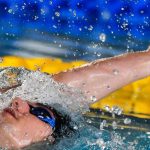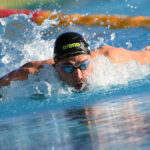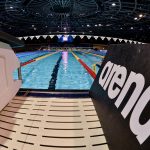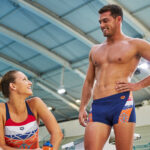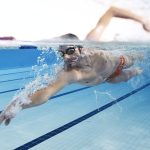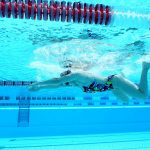Everything you need to know about the strange world of adult swimming
Alarm bells start to ring in the heads of adult swimmers as the time approaches for their lesson to begin: just like all good students they have the very best of intentions as they prepare for their toughest class: swimming.
The conventional way of splitting a class into beginners, intermediates and advanced, which definitely helps the instructor come up with just the right programme, actually covers a whole range of sub-groups. In the case of a beginners group for example, a different teaching approach will be adopted for an adult who is terrified of entering the water and another who feels quite at home and is secretly wondering “Why didn’t I do this earlier?”. The initial contact with the water is vitally important; the instructor, under the guise of Cupid, must make sure it is love at first “splash” for the novice swimmer. Attending class regularly really is the key ingredient for beginners!
The intermediate group is, without a shadow of a doubt, the trickiest in swim class; more often than not it will include both adults who are desperate to move up to the next level and those who, by their very nature, are “always intermediates”. The excitement at striving to reach the advanced level (and hence the risk of getting carried away and “not listening”) often results in everybody remaining at the intermediate level for a long time. The poor old swimming instructor, once the hero of this watery love story, suddenly turns into just another character, overwhelmed by the whims and overzealousness of these novice swimmers. Only patience is truly rewarded!
The so-called “advanced” adults are completely different matter. By definition they advance, explore and dive more deeply into the world of swimming with real aplomb, perfecting their technique and choosing their favourite swim stroke; they suddenly want to try swimming at different paces and inevitably develop what might be described as a “Swiss”-like relationship with the stopwatch, constantly checking their pulse rate with almost obsessive attention; they do exactly what their swim instructor tells them since he is now their one and only mentor.
After the third level there are lots of different branches off this giant tree: open-water swimming, masters swimming and, why not, even masters water polo and, for the most fortunate, may be even a career as a masters diver.
Having the courage to be patient and not expect lightning-fast progress is the real key to this exciting journey in the quest for “aquatic freedom”.
The “gong” sounding at the end of the lesson means the next class is ready to begin!
Written by:
Eugenia Panettieri
Although I was born in Apulia, I work in Tuscany. I am a FIN (Italian Swimming Federation) coach, FIN regional instructor for Tuscany and official judge-referee. I am deeply interested in the technical side of swimming and always on the lookout for new drills and exercises. My favourite “human subject matter” are adults and young beginners. I am totally in love with water in all its different forms. My motto is: “Really experience the water”.
